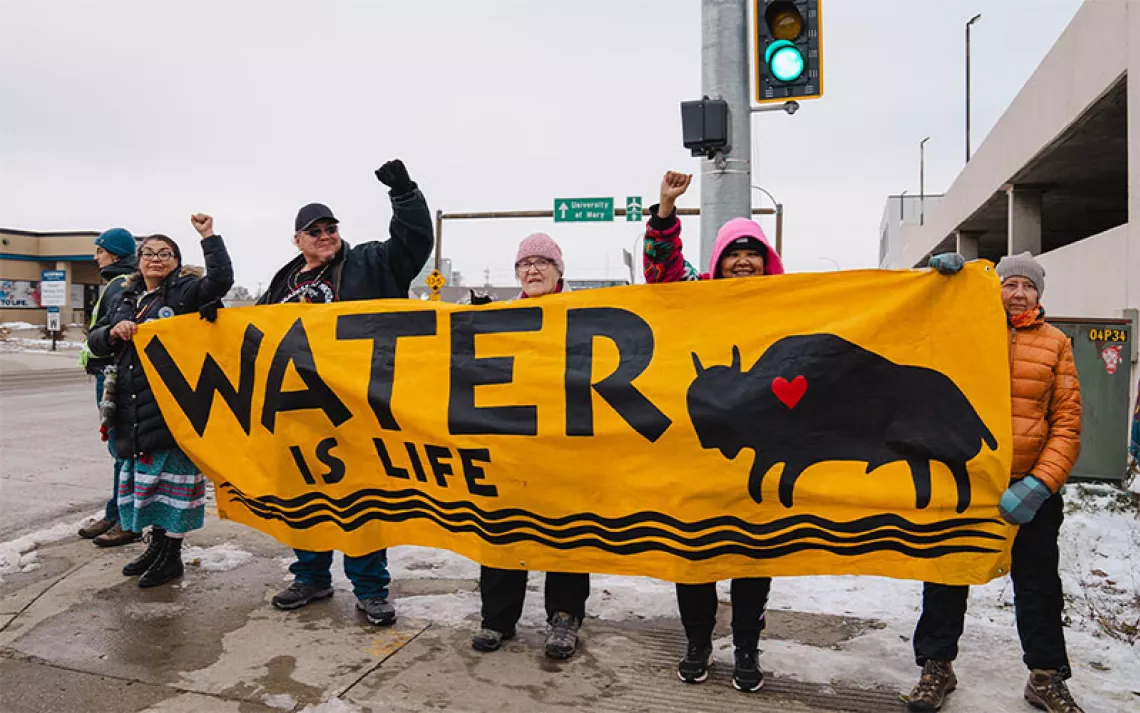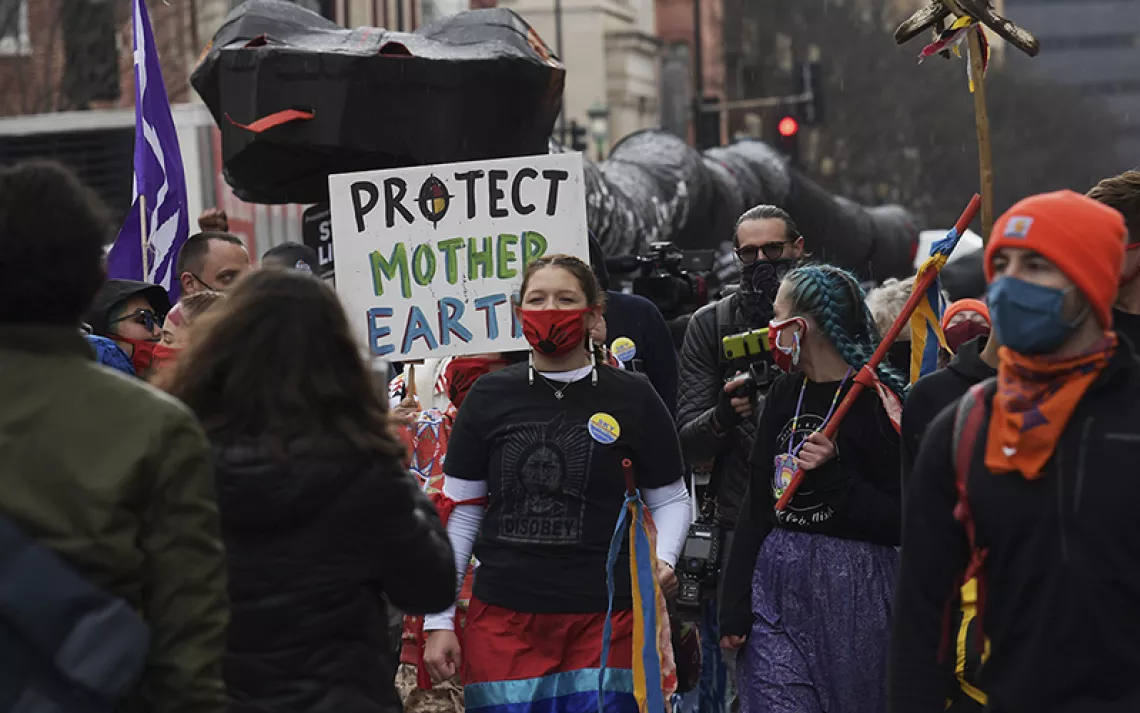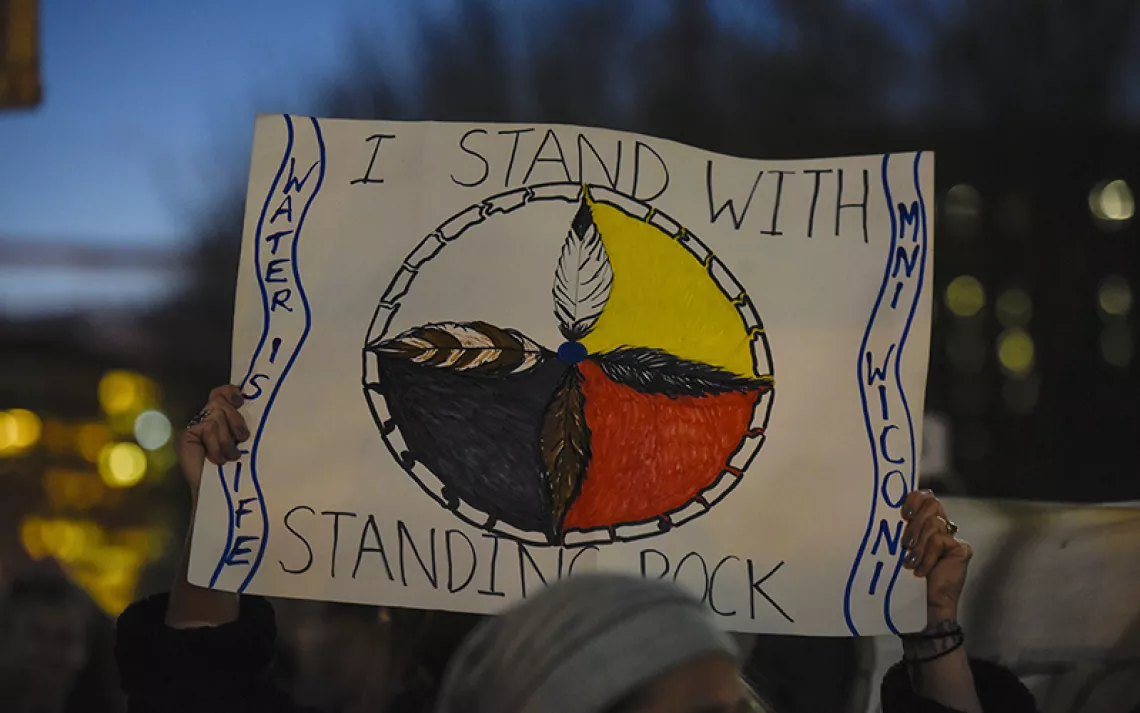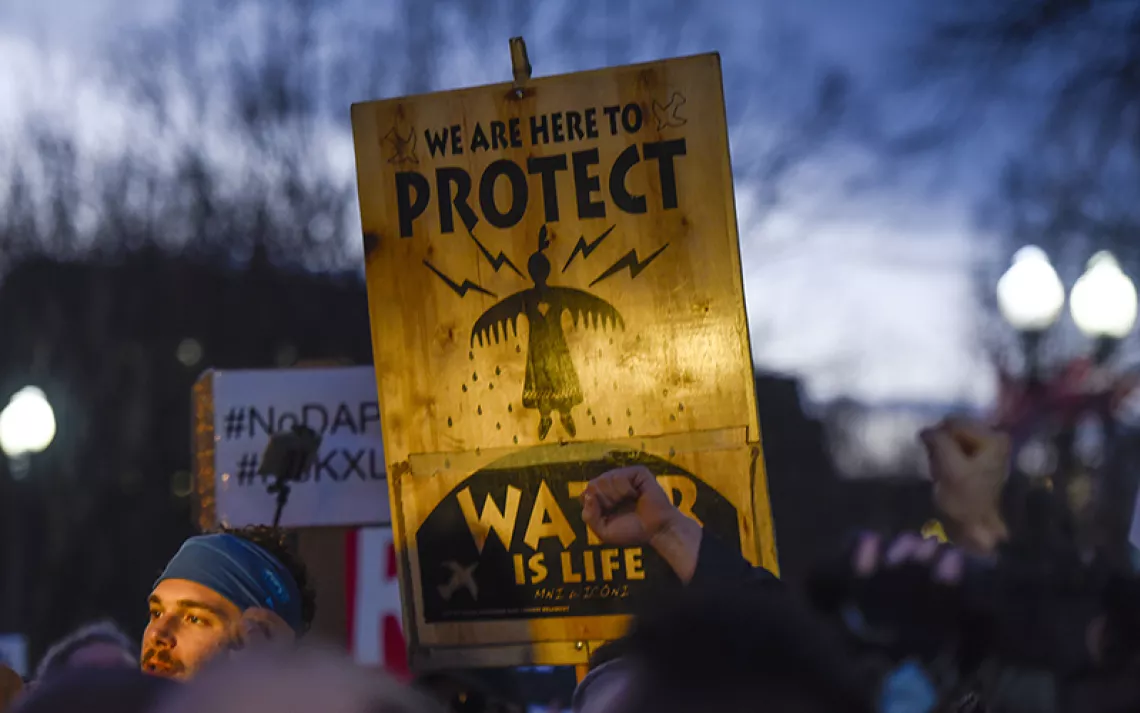States Are Criminalizing Environmental Protest
In some states, protesting against an oil pipeline is a felony
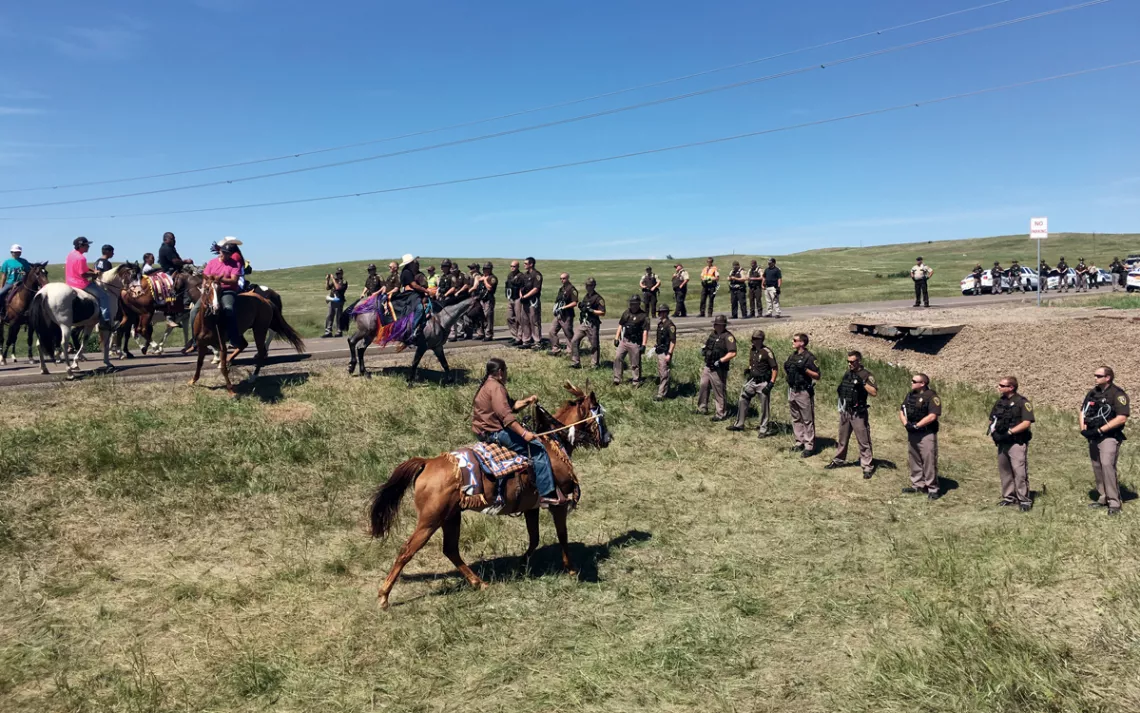
The 2016 Indigenous-led opposition to the Dakota Access Pipeline sparked a raft of state laws seeking to crack down on future protests. | Photo by Daniella Zalcman
When Miami-area artist and filmmaker Gina Cunningham discussed taking a road trip to North Dakota in 2016 with her adult children and her grandchildren, she had a very specific kind of American holiday in mind. The family packed their RV with camping gear and medical equipment, along with plenty of cash for bail and fines. They were heading to join the protests against the Dakota Access Pipeline, which was encroaching onto the Standing Rock Indian Reservation amid concerns that it threatened Sioux water sources and that the tribe was not fully consulted when officials rushed through the pipeline's approval. "The whole family agreed this was a time to bear witness," Cunningham said. "We were exercising our First Amendment rights to engage in protest."
A bout of the flu kept the grandkids and their mom from going, but Cunningham, her husband, and her son-in-law made it to Standing Rock for a week. At that point, the months-long clash had become a high-profile news event. Pipeline owner Energy Transfer Partners had brought in a private security company that had used attack dogs on the protesters, many of whom had needed to be treated for bites. The spectacle so rattled North Dakota lawmakers that they resolved to make sure it wouldn't happen again—by cracking down on demonstrators. Within a year, a raft of new legislation increased fines and penalties for taking part in a protest. Many of the misdemeanor charges Cunningham and her family had been ready to face would now be felonies. "That's overstepping people's constitutional rights, isn't it?" Cunningham asked.
That was only the beginning. Since the Dakota Access Pipeline conflict, 17 states have passed laws aimed at restricting protests, according to the International Center for Not-for-Profit Law (ICNL). Much of that legislation is aimed specifically at environmental protests, raising the penalties for gatherings that take place on "critical infrastructure" sites like pipelines. "This has been an ongoing trend since 2017," said Nicholas Robinson, a senior legal adviser with the ICNL's US program, which has been tracking the spread of these laws out of concern that they infringe on free-speech rights.
If North Dakota was the instigation, Oklahoma became the inspiration. Even as dogs were attacking protesters in North Dakota, the governor of Oklahoma, an oil-producing state, signed a law making trespass on land containing critical infrastructure a felony. Soon after, the American Legislative Exchange Council (ALEC), a conservative organization that spreads cookie-cutter model legislation nationwide, crafted a "Critical Infrastructure Protection Act," which it shopped around to sympathetic lawmakers.
ALEC did not return a call and email seeking comment. But Grant Kidwell, director of its Energy, Environment, and Agriculture Task Force, wrote on ALEC's website that it crafted the law out of concern for public safety: "Whether its [sic] vandalism or protesters turned violent, a few people can cause tremendous harm to their fellow citizens by damaging critical infrastructure sites," Kidwell wrote. "Stopping the flow of a pipeline can cause pressure to build and puts thousands at risk of harm from an explosion. While peaceful protests are an important part of Americans [sic] right to free speech, causing damage and putting others at risk of harm is not."
Civil liberties groups are alarmed by Oklahoma's law and the spread of ALEC's generic imitations. Robinson finds three provisions of particular concern. The first is the extreme penalty for trespass on land containing critical infrastructure. Pipelines, for instance, can stretch for miles, he noted, crossing streets and walkways, so someone could be charged for standing on public property. The second is the vague language they use about impeding access to, or construction of, critical infrastructure, which makes it unclear what a protester has to do to remain within legal bounds. Third is the laws' inclusion of different forms of collective liability, such as conspiracy. Again, the scope of the transgression is vague. Is someone liable if they hand a bottle of water to a protester who is trespassing? Is the person who organizes a protest liable for the actions of all the protesters?
Taylor Becker is the Sierra Club's deputy director of state lobbying and advocacy, working against such legislation. "These laws are a result of the collective power people showed against pipelines like Keystone XL and Dakota Access," she said. "Criminalizing protest is an erosion of democratic principles and something that should be of concern to every American, regardless of political persuasion."
"As a matter of due process, we should know what conduct is criminal and not criminal in our laws," said Vera Eidelman, staff attorney with the American Civil Liberties Union (ACLU). The concern is that these laws are not truly intended to protect infrastructure (trespassing and damaging property are already illegal, Eidelman noted) but instead are intended to discourage free speech.
In 2019, the ACLU sued South Dakota on behalf of the Sierra Club, NDN Collective, Dakota Rural Action, and the Indigenous Environmental Network, arguing that three of the state's laws violated freedom-of-speech provisions of the First Amendment, including the new "riot boosting" act and two older criminal laws that threatened prison sentences of up to 25 years for activists who encourage or organize protests on critical infrastructure property. The environmental groups won, forcing the state to stop enforcing the laws.
These efforts to criminalize protest go beyond environmental issues. Demonstrations by the Black Lives Matter movement in the wake of the murder of George Floyd in 2020 resulted in broad anti-protest laws in 11 states. Iowa and Oklahoma granted civil immunity to drivers who strike demonstrators with their cars. And following recent attacks by far-right groups on electrical substations in hopes of accelerating societal collapse, even the dark-blue state of Oregon is now proposing a law raising the penalties for disrupting services from critical infrastructure like gas and oil pipelines and electrical stations.
"There's a new generation of these bills. They come out of a different concern, and they're getting bipartisan support," the ICNL's Robinson said. "Just to be clear, we're against the shooting up of electrical substations. But the language they're using is overly broad."
If the intended result of these laws is to chill free speech, they haven't deterred people like Cunningham. Her next trip would be to northwest Canada to support the Wet'suwet'en First Nation as it fights the construction of a fracked gas pipeline across its land.
 The Magazine of The Sierra Club
The Magazine of The Sierra Club
